Nginx四层负载均衡1
1、Nginx负载均衡Redis
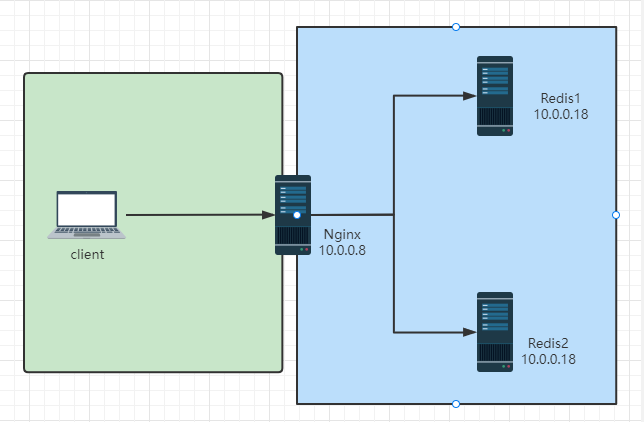
| 服务器 | IP地址 | 作用 | 系统版本 |
|---|---|---|---|
| Nginx代理服务器 | 10.0.0.38 | 负载均衡服务器 | Rocky8.6 |
| Redis服务器1 | 10.0.0.18 | Redis服务器1 | Rocky8.6 |
| Redis服务器2 | 10.0.0.28 | Redis服务器2 | Rocky8.6 |
| client | 10.0.0.101 | 测试访问网站 | Ubuntu2004 |
# 安装redis服务器
# Rides1(10.0.0.18):
[root@redis1 ~]# yum install -y redis
[root@redis1 ~]# vim /etc/redis.conf #修改监听端口
bind 0.0.0.0
[root@redis1 ~]# systemctl restart redis
[root@redis1 ~]# ss -ntl # 查看6379端口是否开启
State Recv-Q Send-Q Local Address:Port Peer Address:Port Process
LISTEN 0 128 0.0.0.0:6379 0.0.0.0:*
==========================================
# Rides2(10.0.0.28):
[root@redis2 ~]# yum -y install redis
[root@redis2 ~]# vim /etc/redis.conf
bind 0.0.0.0
[root@redis2 ~]# systemctl restart redis
# Nginx服务器(10.0.0.38):
# 提前安装好Nginx,这里是编译安装到/apps/nginx里
[root@Nginx nginx]# vim /apps/nginx/conf/nginx.conf
include /apps/nginx/conf/tcp/*.conf; #不建议直接更改主配置,所以增加一个包含目录(注意:此处和http是并列级别)
[root@Nginx nginx]# vim /apps/nginx/conf/tcp/redis.conf
stream {
upstream redis_server{
server 10.0.0.18:6379 max_fails=3 fail_timeout=30s;
server 10.0.0.28:6379 max_fails=3 fail_timeout=30;
}
server {
listen 80;
proxy_pass redis_server;
proxy_connect_timeout 3s;
proxy_timeout 3s;
}
}
#客户端安装redis测试:
[root@ubuntu2004 ~]#redis-cli -h 10.0.0.38 set name b #增加一个name的变量,值是b
OK
[root@ubuntu2004 ~]#redis-cli -h 10.0.0.38 get name #查询name变量
"b"
[root@ubuntu2004 ~]#redis-cli -h 10.0.0.38 get name
(nil)
[root@ubuntu2004 ~]#redis-cli -h 10.0.0.38 get name
"b"
[root@ubuntu2004 ~]#redis-cli -h 10.0.0.38 get name
(nil)
## 可以看到负载到两台rides上了。
2、Nginx负载均衡MySQL
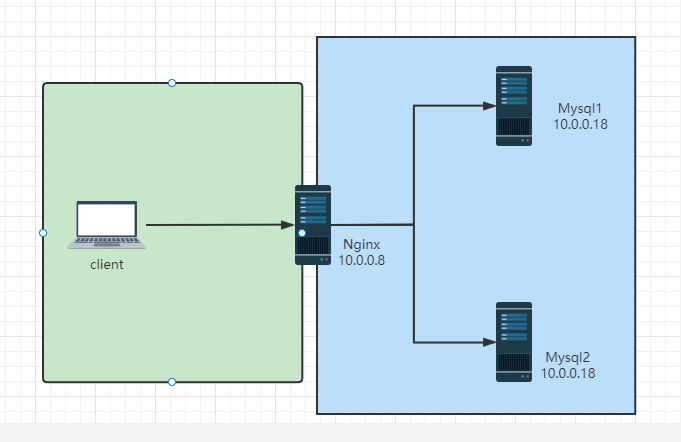
| 服务器 | IP地址 | 作用 | 系统版本 |
|---|---|---|---|
| Nginx代理服务器 | 10.0.0.38 | 负载均衡服务器 | Rocky8.6 |
| Mysql服务器1 | 10.0.0.18 | Mysql服务器1 | Rocky8.6 |
| Mysql服务器2 | 10.0.0.28 | Mysql服务器2 | Rocky8.6 |
| client | 10.0.0.101 | 测试访问网站 | Ubuntu2004 |
#mysql两台服务器做主主复制:(参见本人博客“Rocky之Mysql主从复制”第6节)
mysql> create user wang@'10.0.0.%' identified by '123456'; #增加一个测试用户
mysql> flush privileges;
========================================================
# Nginx(10.0.0.38):
[root@rocky8 nginx-1.22.0]#vim /apps/nginx/conf/tcp/redis.conf
stream {
upstream redis_server{
server 10.0.0.18:6379 max_fails=3 fail_timeout=30s;
server 10.0.0.28:6379 max_fails=3 fail_timeout=30;
}
upstream mysql_server {
server 10.0.0.18:3306 max_fails=3 fail_timeout=30s;
server 10.0.0.28:3306 max_fails=3 fail_timeout=30;
}
server {
listen 6379;
proxy_pass redis_server;
proxy_connect_timeout 3s;
proxy_timeout 3s;
}
server {
listen 3306;
proxy_pass mysql_server;
}
}
[root@rocky8 nginx-1.22.0]#nginx -s reload
====================================================
#客户端测试:
[root@rocky8 ~]# mysql -uwang -p123456 -h10.0.0.38 -e 'select @@server_id;'
mysql: [Warning] Using a password on the command line interface can be insecure.
+-------------+
| @@server_id |
+-------------+
| 28 |
+-------------+
[root@rocky8 ~]# mysql -uwang -p123456 -h10.0.0.38 -e 'select @@server_id;'
mysql: [Warning] Using a password on the command line interface can be insecure.
+-------------+
| @@server_id |
+-------------+
| 18 |
+-------------+
[root@rocky8 ~]# mysql -uwang -p123456 -h10.0.0.38 -e 'select @@server_id;'
mysql: [Warning] Using a password on the command line interface can be insecure.
+-------------+
| @@server_id |
+-------------+
| 28 |
+-------------+
[root@rocky8 ~]# mysql -uwang -p123456 -h10.0.0.38 -e 'select @@server_id;'
mysql: [Warning] Using a password on the command line interface can be insecure.
+-------------+
| @@server_id |
+-------------+
| 18 |
+-------------+
3、Rockey搭建LNMP(Nginx与php-fpm在同一服务器 )
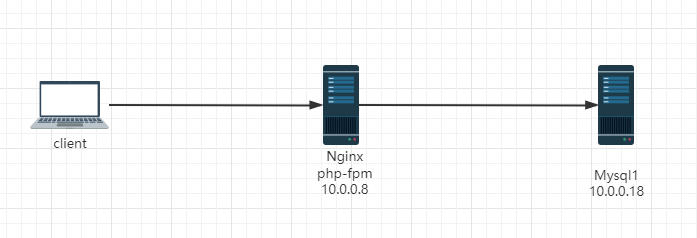
| 服务器 | IP地址 | 作用 | 系统版本 |
|---|---|---|---|
| Nginx和PHP服务器 | 10.0.0.38 | Nginx+php-fpm服务器 | Rocky8.6 |
| Mysql服务器 | 10.0.0.18 | Mysql服务器 | Rocky8.6 |
| client | 10.0.0.101 | 测试访问网站 | Ubuntu2004 |
# nginx服务器(10.0.0.38):
[root@nginx ~]#yum install php-fpm php-mysqlnd php-json #安装php相关包已经依赖
[root@nginx ~]#vim /etc/php-fpm.d/www.conf #修改配置文件,最后结果如下:
[root@nginx ~]#egrep -v "^;|^$" /etc/php-fpm.d/www.conf
[www]
user = nginx # 最好改为nginx运行的用户
group = nginx # 最好改为nginx运行的组
listen = 127.0.0.1:9000 #监听地址及IP (跨网络需要写网卡的IP)
pm.status_path = /pm_status #取消注释
ping.path = /ping #取消注释
ping.response = pong #取消注释
slowlog = /var/log/php-fpm/www-slow.log #慢日志路径,不用修改
php_admin_value[error_log] = /var/log/php-fpm/www-error.log #错误日志路径,不用修改
php_value[session.save_handler] = redis #修改此行
php_value[session.save_path] = "tcp://redis-server:6379" #修改此行
[root@nginx ~]#systemctl restart php-fpm.service
[root@nginx ~]#ss -ntl #查看端口是否开启
LISTEN 0 128 127.0.0.1:9000 0.0.0.0:*
[root@nginx ~]#vim /apps/nginx/conf/nginx.conf
include /apps/nginx/conf/conf.d/*.conf; #在http内增加
[root@nginx ~]#mkdir /apps/nginx/conf/conf.d
[root@nginx ~]#vim /apps/nginx/conf/conf.d/php.conf
server {
listen 80;
server_name www.wang.org;
root /data/html; #静态页面访问/data/html
location ~ \.php$ {
root /data/php; #以php结尾的文件访问此目录
fastcgi_pass 127.0.0.1:9000;
fastcgi_index index.php;
fastcgi_param SCRIPT_FILENAME $document_root$fastcgi_script_name; #$document_root也可以写成上边root的目录:/data/php
include fastcgi_params;
}
}
[root@nginx ~]#mkdir -p /data/php
[root@nginx ~]#mkdir /data/html
[root@nginx ~]#vim /data/php/index.php
<?php
phpinfo();
?>
[root@nginx ~]#vim /data/html/index.html
www.wang.org
[root@nginx ~]#nginx -s reload
=========================================
# 客户端测试连接:


# Mysql(10.0.0.18):安装mysql并创建用户
mysql> create user wang@'10.0.0.%' identified by '123456';
mysql> grant replication slave on *.* to repluser@'10.0.0.%';
mysql> flush privileges;
===================================================
# nginx服务器(10.0.0.38):
[root@nginx ~]#vim /data/php/mysql.php #测试连接数据库文件
<?php
$servername = "10.0.0.18";
$username = "wang";
$password = "123456";
// 创建连接
$conn = mysqli_connect($servername,$username, $password);
// 检测连接
if (!$conn) {
die("php连接MySQL数据库失败: " . mysqli_connect_error());
}
echo "php连接MySQL数据库成功!";
?>

# 修改配置页面测试ping和pm_status页面:(10.0.0.38):
[root@nginx ~]#vim /apps/nginx/conf/conf.d/php.conf
server {
listen 80;
server_name www.wang.org;
root /data/html;
location ~ \.php$|ping|pm_status { #增加ping和pm_status
root /data/php;
fastcgi_pass 127.0.0.1:9000;
fastcgi_index index.php;
fastcgi_param SCRIPT_FILENAME $document_root$fastcgi_script_name;
include fastcgi_params;
}
}
[root@nginx ~]#nginx -s reload

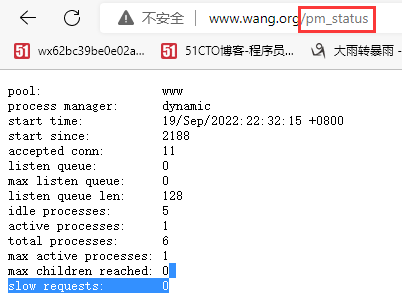
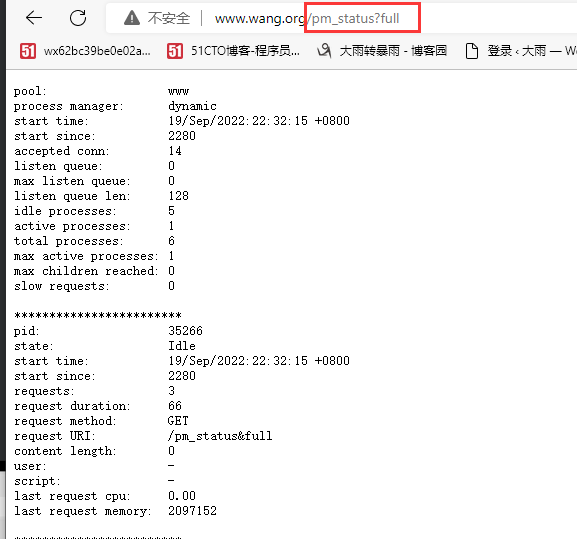

本文来自博客园,作者:大雨转暴雨,转载请注明原文链接:https://www.cnblogs.com/wdy001/p/16709512.html


